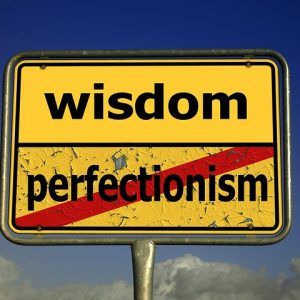There's a quote from Naval Ravikant that I think about often:
[bctt tweet="Desire is a contract you make with yourself to be unhappy until you get what you want." username="QaziniKenya"]
How do you separate the positive benefits of growth, accomplishment, and success with the underlying theme that you, we, do all of these things at least partially out of a sense of insecurity?
How do you know what your real motivations are? Are you chasing a dream because you want the dream or was it a dream that was implanted in your mind? Shouldn't you just be happy and content?
Theoretically, this is possible. This is what Eastern Philosophy teaches. It teaches you to free yourself from desire by staying present in the moment and ultimately realizing the meaninglessness of everything in your life.
I once read this book by a Zen teacher. This was at a point in my life where I got so heavy into meditation and yoga that I seriously considered moving to Tibet, renouncing all my possessions, living in a cave, and meditating for hours. The book basically taught you that you were to interpret everything as nothing. Your emotions? Nothing. Just fleeting physiological responses that you attach meaning to. Your goals, desires, and wants? Nothing. Just culturally influenced ideas in your head. Sadness, pain, frustration? Nothing. Just the lens you put on situations.
After reading this book, and going through this phase, I realized that I wanted more than nothing. Still to this day, I accept the underlying notion that desiring is suffering, but I've come to the conclusion that some things are worth suffering for. The way that I look at it, you're going to go through some discomfort either way -- might as well be toward a worthwhile end that makes you feel something. You know?
Because as nice as it sounds to just be content, you live in the physical and material world, which has such an influence on you that it's going to be difficult to just sit in a cave and meditating endlessly. Your perception of the world comes from the combination of culture and your wiring as a human being. When you work to fulfil your desires, there's a way to do it that focuses on solid reasons for pursuing them, even if you're driven a bit by the need to fill a void.
So, what are good reasons to fulfil your desires?
For one, you can look at fulfilling your desires through another lens. You can look at it through the lens of alleviating problems that frustrate you. That was a big one for me.
It was frustrating to live paycheck to paycheck. Like I said in the story I told in chapter 5 of my book, it was frustrating as a man to not be able to provide for my family the way I wanted to -- call it too traditional, but that's the way I felt. It was frustrating to have to go to a job and listen to people who weren't smarter than me, to have to deal with clients who didn't appreciate me and to have to do all of it for less than what my services were actually worth.
The biggest frustration? Knowing that I was capable of doing more but I wasn't doing anything about my situation. That's the biggest frustration achieving success or fulfilling your desires alleviates. It alleviates the not knowing. That subtle yet persistent and gnawing feeling that whispers to you "What the hell are you doing with your life?"
Now I know. And getting what you want isn't necessarily all it's cracked up to be, but it still feels good to look back on everything you had to go to get to the point you're at today, especially if it's a point you could barely fathom in the past. You get to look in the mirror and know that you are who you always thought you were. That's a good reason.
Here are some other good reasons for fulfilling your desires:
- You can be an example - My kid gets to know her father is someone who went after what he wanted and got it. I don't have to be one of those parents who said I sacrificed my dreams for my kid because I didn't. She doesn't have to carry that unwarranted sense of guilt.
- It's nice to have a few pleasures in life - Admit it. Maybe you want to take two vacations a year instead of one, get a nicer car, go to more concerts (in normal times), whatever it is.
- Freedom - If you're geared toward freedom, you get what you want so that you no longer have to be a prisoner of your own life -- your job, your bills, and all the other BS.
- The challenge - Too many people live a life without struggle and challenge. This manifests itself in all sorts of ways, but it mostly turns people apathetic. Having something to strive for helps you maintain your vigour.
- You have nothing better to do - You could go sit in that cave and meditate if you want, but odds are you're going to be here for a while, might as well pursue some goals and have fun doing it.
Getting some success mellowed me out a bit. It gave me perspective. I still feel the pull of desire every single day. I still see how it has a negative impact on my life if I pursue it too much, but I don't have to sit around every day wondering what's possible. I've come to realize that there are no limits. Life is now more like a game where I'm just seeing what I can do for the hell of it, for the challenge, to make use of my time now that I'm free, to enjoy a few pleasures, to be an example.
Go on that path. And once you successfully finish an arc in your life, do this next.
This is how you escape the trap
Another quote that I think about often from Morgan Housel:
[bctt tweet="The hardest but most important financial skill is getting the goalpost to stop moving." username="QaziniKenya"]
That's not just a quote about money. It's a quote about life in general. That's the trick. Get what you want, but get it to an extent and stop. Master the tricky skill of learning to not necessarily quit while you're ahead, but chill out once you have some security.
I used to think I wanted to be some mega-millionaire. Now? A nice lifestyle with the freedom to do what I want, with a few ostentatious exceptions, is enough for me. Sure, I'll travel and buy some nice things from time to time, but I'm trying to play the game for the sake of playing the game now. It's hard.
All of this is hard.
That's key to remember. There's no perfect answer to any of this. There's no state of mind or net worth that's going to cure you of your problems and anxieties totally. You escape the trap by understanding that you're always going to be in it. This isn't depressing. It's liberating.
Once you stop trying to be perfect and stop trying to reach some perfect end state that never exists, you can start to live.





